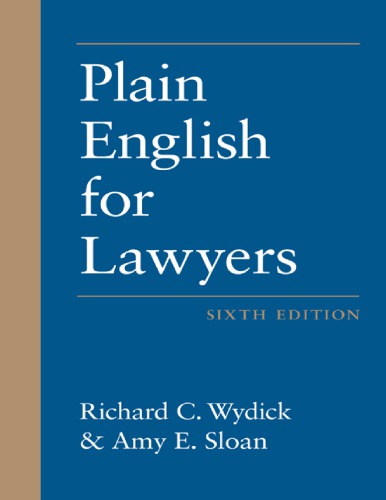Product desciption
Plain English For Lawyers 6th Richard C Wydick Amy E Sloan by Richard C. Wydick; Amy E. Sloan 9781531006990, 153100699X instant download after payment.
Plain English for Lawyers has been a favorite of law students, legal writing teachers, lawyers, and judges for almost 40 years. The sixth edition, now co-authored by Amy Sloan, updates this classic text, including new chapter exercises, while preserving all the approaches that make it such a standard in the field. It remains (in size only!) a little book, small enough and palatable enough not to intimidate over-loaded law students.
In January 2005, the Legal Writing Institute gave Wydick its Golden Pen Award for having written Plain English for Lawyers. The Legal Writing Institute is a non-profit organization that provides a forum for discussion and scholarship about legal writing, analysis, and research. The Institute has over 1,300 members representing all of the ABA-accredited law schools in the United States. Its membership also includes law teachers from other nations, English teachers, and practicing lawyers.
The LWI award states: “Plain English for Lawyers … has become a classic. Perhaps no single work has done more to improve the writing of lawyers and law students and to promote the modern trend toward a clear, plain style of legal writing.”
“[P]robably the most popular legal text today…” — The New York Times, on an earlier edition
“[A] survival kit for the profession. It should be on every lawyer's desk.” — New Jersey Lawyer, on an earlier edition
“Plain English for Lawyers is a classic that deserves a place on every lawyer's shelf. It is everything that a writing book should be — clear, concise, spirited, practical, accessible, and sound.” — The Scribes Journal of Legal Writing, on the fourth edition
“Wydick's Plain English for Lawyers is the most practical book of its kind, following in the fine tradition of Strunk and White's The Elements of Style.” — The National Law Journal, on an earlier edition
“A classic updated for today’s students. Concise, clear, and comprehensive. It doesn't get any better than that.”—Linda H. Edwards, Boyd School of Law, UNLV
“Hurray for the sixth edition of Plain English for Lawyers! Professor Sloan has masterfully retained Professor Wydick’s rich tradition of providing easy-to-understand advice and helpful exercises to improve legal writing clarity. This new edition updates the timeless advice and exercises for which Plain English for Lawyers is so well known, and it also provides innovative ideas on design techniques that are particularly useful for electronic and digital communications. Lawyers and law students alike will enhance their written communication skills by reviewing the advice and practicing the techniques contained in this book.”—Christine Nero Coughlin, Wake Forest University School of Law


